- Home
- Undergraduate
- Academics
- Health and Exercise Science
Health and Exercise Science
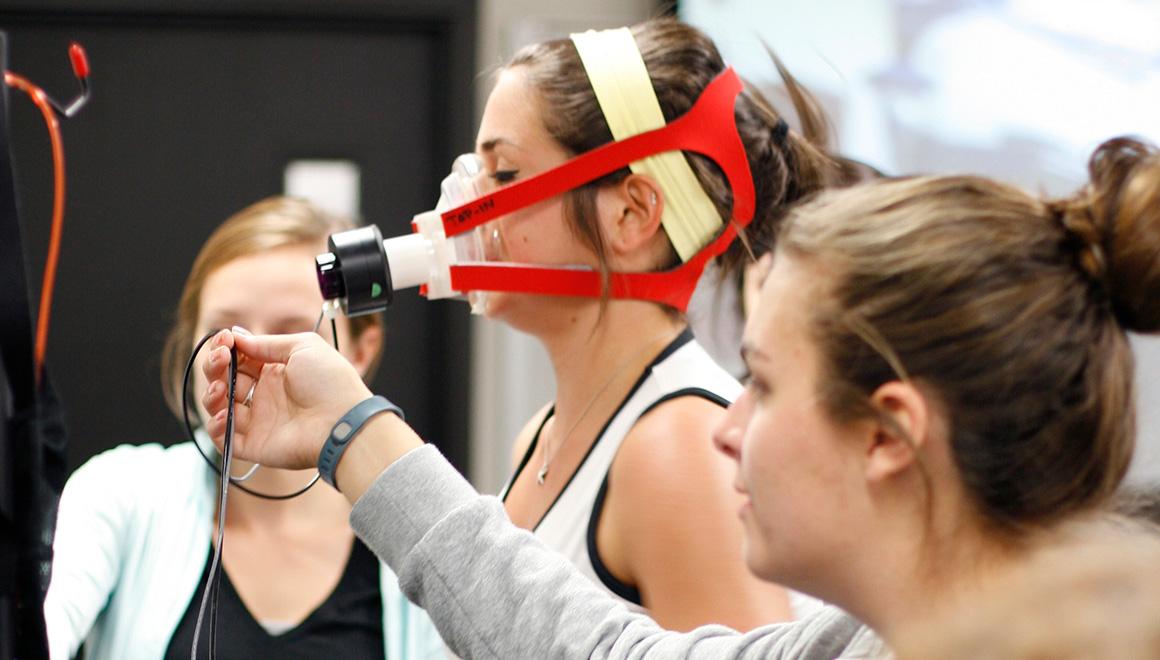
Are you ready to get moving?
Simmons University’s Health and Exercise Science program prepares you for rewarding careers within the healthcare, fitness, and wellness fields.
You will receive a solid foundation in the sciences of exercise and health through hands-on experiences and coursework in the health and fitness industry. Learn how the human body moves, performs, and heals through courses in anatomy and physiology, kinesiology, exercise physiology, and nutrition.
You will learn to assess fitness, design exercise programs, prevent injuries, and promote overall wellness. The curriculum also covers health psychology, behavior change, and research methods to help you understand the physical and mental factors influencing health.
Throughout your time in the program, you’ll have the opportunity to conduct clinical research, work in rehabilitation settings, develop, and lead group exercise and physical activity programs, and more. These opportunities provide skills mastered through service learning engagement with community organizations, and in Boston’s world-class health centers.
Health and Exercise degree career pathways
The Health and Exercise Science major is excellent preparation for graduate school in fields such as physical therapy, nutrition, public health, and behavioral analysis. Explore career tracks in the allied healthcare space on our Pre-Health Professions Track page.
At Simmons, we offer programs to fast-track your studies to advanced degrees and exciting career opportunities. Learn more about our accelerated Health and Exercise Science + Nutrition and Health Promotion (4+1) and Doctor of Physical Therapy program (3+3).
Majors will complete four prerequisite courses, a core consisting of ten courses plus one elective spread out across their four years. All Majors are required to have CPR and First Aid Certifications by March 1 of their senior year. 3+3 Health and Exercise Science/DPT students should refer to the undergraduate DPT course sequence in the course catalog. The suggested four-year sequence for core courses is detailed below.
First Year
| BIOL113 | General Biology | 4 |
| CHEM111 | Principles of General Chemistry | 4 |
| OR | ||
| CHEM113 | General & Quantitative Chemistry I | 4 |
| CHEM112 | Principles of Organic Chemistry | 4 |
BIOL 113, CHEM 111, CHEM 113, and CHEM 112 all include labs.
BIOL 113, and STAT 118 or STAT 239: prereq. for BIOL 246.
CHEM 111, CHEM 112: prereq. for BIOL 231.
First Year or Sophomore Year
| STAT118 | Introductory Statistics | 4 |
| PSYC101 | Introduction to Psychological Science | 4 |
| NUTR112 | Introduction to Nutrition Science | 4 |
| EXSC100 | Introduction to Exercise Science | 2 |
| EXSC110 | Form and Function in Resistance Exercise | 2 |
Sophomore Year
| BIOL231 | Anatomy and Physiology I | 4 |
| BIOL232 | Anatomy and Physiology II | 4 |
| BIOL246 | Foundations of Exercise and Health | 4 |
Junior Year
| BIOL332 | Exercise Physiology | 4 |
| PSYC232 | Health Psychology | 4 |
| EXSC361 | Exercise Assessment & Prescription | 4 |
| CPR with AED Training -offered during DPT orientation-junior year summer |
BIOL 332 and EXSC 361 include labs.
BIOL 332: prereq. for EXSC 361.
First Aid Certification offered during EXSC 361 lab at cost.
Senior Year
| BIOL362 | Kinesiology | 4 |
| BIOL370 | Internship | 4 |
BIOL 362 includes lab
BIOL 370: 8 credits (4 credits in Fall and 4 credits in Spring)
** Students in both the 3+3 accelerated and the 4 + 3 BS Health and Exercise Science and DPT programs require 2 semesters of physics prior to entering the grad program: PHYS 110 and PHYS 111; both courses include labs.
In addition, students on the 3+3 DPT track do NOT complete BIOL 362 or BIOL 370.
Courses in DPT curriculum that satisfy Health and Exercise Science degree requirements
DPT 612 and DPT 672: Serve as a replacement for BIOL 370 (Fall)
DPT 613 and DPT 673: Serve as a replacement for BIOL 370 (Spring)
DPT 621 and DPT 622: Serve as a replacement for BIOL 362
DPT 652: Serves as a replacement for 2nd EXSC elective (1st met by PHYS 110)
| DPT612 | Professional Seminar I | 1 |
| DPT672 | Frameworks of Physical Therapy: Musculoskeletal I | 7 |
| DPT613 | Professional Seminar II | 1 |
| DPT673 | Frameworks of Physical Therapy: Musculoskeletal II | 7 |
| DPT621 | Human Anatomy | 7 |
| DPT622 | Movement Science I | 3 |
| DPT652 | Evidence Informed Practice I | 2 |
Health and Exercise Science Electives
| AST232 | Race, Gender & Health | 4 |
| BIOL221 | Microbiology | 4 |
| BIOL233 | Strength and Conditioning | 4 |
| BIOL334 | Neurobiology | 4 |
| BIOL336 | Genetics | 4 |
| BIOL337 | Molecular Biology | 4 |
| CHEM223 | Principles of Biochemistry | 4 |
| CHEM224 | Organic Chemistry I | 4 |
| CHEM225 | Organic Chemistry II | 4 |
| CHEM345 | Biochemistry | 4 |
| EXSC233 | Strength and Conditioning | 4 |
| Mind-Body Medicine | ||
| NUTR110 | Sociocultural Implications of Nutrition | 4 |
| NUTR215 | Sports Nutrition | 4 |
| NUTR311A | Nutrient Metabolism Part I | 4 |
| NUTR360 | Lifestyle Rx | 4 |
| NUTR405 | Psychological Aspects of Sport and Exercise | 3 |
| PH101 | Introduction to Public Health | 4 |
| PH201 | Introduction to Epidemiology | 4 |
| PH345 | Health Systems & Policy | 4 |
| PHIL130 | Ethics | 4 |
| PHYS110 | Introductory Physics I | 4 |
| PHYS111 | Introductory Physics II | 4 |
| PSYC231 | Psychopathology and Mental Health | 4 |
| PSYC235 | Developmental Psychology | 4 |
| PSYC236 | Psychology of Adolescence | 4 |
| SOCI231 | Sociology of Childhood | 4 |
| SOCI241 | Health, Illness & Society | 4 |
| SOCI245 | Global Health | 4 |
| SOCI266 | Sociology of Sports | 4 |
| PH345 | Health Systems & Policy | 4 |
The Health and Exercise Science minor allows any interested student an opportunity to gain knowledge of the role that exercise plays in health and disease. Minors typically consist of 20 credits. No more than two transfer courses can be counted, and must be approved by the chair.
Student must complete all of the required courses and an additional elective from the list below.
Required Courses
| BIOL246 | Foundations of Exercise and Health | 4 |
| BIOL332 | Exercise Physiology | 4 |
| EXSC100 | Introduction to Exercise Science | 2 |
| EXSC110 | Form and Function in Resistance Exercise | 2 |
| STAT118 | Introductory Statistics | 4 |
Health and Exercise Science Elective List
| AST232 | Race, Gender & Health | 4 |
| EXSC233 | Strength and Conditioning | 4 |
| CHEM223 | Principles of Biochemistry | 4 |
| SOCI241 | Health, Illness & Society | 4 |
| PH345 | Health Systems & Policy | 4 |
| SOCI266 | Sociology of Sports | 4 |
| NUTR110 | Sociocultural Implications of Nutrition | 4 |
| NUTR215 | Sports Nutrition | 4 |
| NUTR311A | Nutrient Metabolism Part I | 4 |
| NUTR360 | Lifestyle Rx | 4 |
| Mind-Body Medicine | ||
| PHYS110 | Introductory Physics I | 4 |
Facilities and Equipment:
The Exercise Physiology lab contains high level research grade equipment for students to gain experience and develop hands-on skills in assessing determinants of health.
Our students master skills in areas such as measurement and assessment of oxygen consumption (VO2), neuromuscular activation (EMG), thermogenic, metabolic, pulmonary and cardiovascular responses to exercise, and more. Our newly renovated Science Labs and Holmes Sports Center serve as a living lab for acquiring skills in Exercise Assessment and Prescription, Kinesiology, Exercise Physiology, Strength & Conditioning, and Foundations of Exercise and Health.
Internship and Research Opportunities:
Simmons is located in the Longwood Medical area, home to world class medical, clinical and research facilities. Our students have completed a variety of research and internship experiences at regionally and world renowned organizations:
- BostonChildren's Hospital
- Brigham and Women's Hospital
- Mass General Hospital
- Beth Israel Deaconess
- Dana Farber Cancer Institute
- Joslin Diabetes Center
- Harvard Medicine Ginty Lab
- Tufts Medical Center
- Spaulding Rehab Hospital
- Boston Medical Center
- and more
- Scientific Foundation: Develop a solid understanding of anatomy, physiology, kinesiology, and nutrition.
- Practical Skills: Ability to implement health & fitness assessment, exercise program design, injury prevention, and leading physical activity.
- Health Promotion: Develop a solid understanding of physical and mental factors influencing health, behavior change, and wellness.
- Data & Technology: Ability to utilize industry technology for physiological testing, movement analysis, data acquisition, and analysis.
- Diverse Populations: Ability to apply skills to children, adults, aging individuals, and those with disabilities or chronic conditions.
- Research & Experience: Ability to design, oversee, and interpret results of independent research projects.
Spotlight on Exercise Science Students and Alums
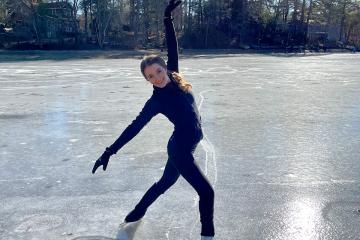
Athlete Discovers Value of Nutrition
Accelerated student Arianna Joyce ’26, ’27MS is a competitive figure skater who is passionate about nutrition. We spoke with her about the encouraging community at Simmons and the value of an accelerated education.
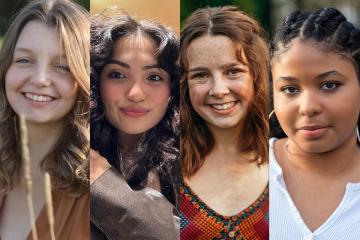
Simmons Welcomes New Cohort of Bonner Community Leaders
The Bonner Community Leaders Program is a unique opportunity for students who want to combine a strong commitment to service with personal growth, teamwork, leadership development, and scholarship. We spoke with Ellie Foss ’28, Jocelyn Miranda Landaverde ’28, Bridget Swezey ’28, and Soraya Timas ’28 about what drew them to the program.
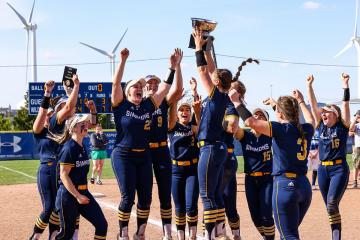
Exercise Science Alumna Interviewed in The Boston Globe
The Globe interviewed Francesca Corsinetti ’19 an occupational therapist, high school basketball coach, and founder of The Sports OT (a program that helps current and retired athletes navigate the complexities of mental health).
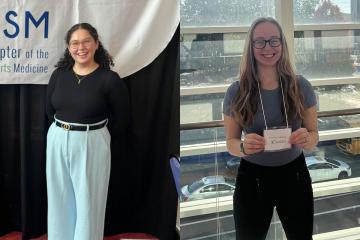
Simmons Exercise Science Alumnae Share Research at Conference
Health and Exercise Science alumnae Haleigh St.Hilaire ’24, ’26MPH and Caroline Aspinwall ’24 recently presented their respective research at the New England chapter of the American College of Sports Medicine (NEACSM) conference.
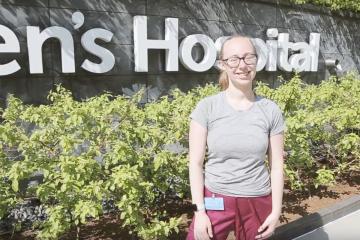
Exercise Science Student Interns at Boston Children's Hospital
Caroline Aspinwall ’24, majoring in Health and Exercise Science with a minor in Psychology, shares details about her internship experience at Boston Children’s Hospital.
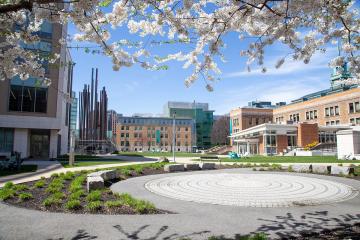
Nutrition Professor Receives Award from Academy of Nutrition and Dietetics Foundation
Recognizing the professional achievements of Assistant Professor of Nutrition Dr. Jacqueline Beatty, the Academy of Nutrition and Dietetics Foundation honored her with the 2024 Margene Wagstaff Award for Innovation in Dietetics Education.
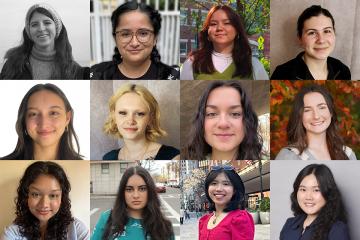
Congratulations to the 2024 SURPASs Scholars
Twelve undergraduate scholars from different disciplines have been selected to join the Summer Undergraduate Research Program at Simmons (SURPASs), a highly competitive, fully funded research and mentorship program. During this six week intensive, students will work with a faculty mentor to execute an independent research project of their own design and development.

Finding Community at Simmons as a Transfer Commuter Student
While at Simmons, Exercise Science major and Healthcare Management minor Kiani Jacobs ’23 received the 2023 Senior Scholar Award and interned at the Harvard Medical Ginty Lab on Neurological Research. She reflects on the value of time spent in the lab, planning events with student groups, and finding her place — as a transfer student and a commuter — at Simmons.
Our Faculty
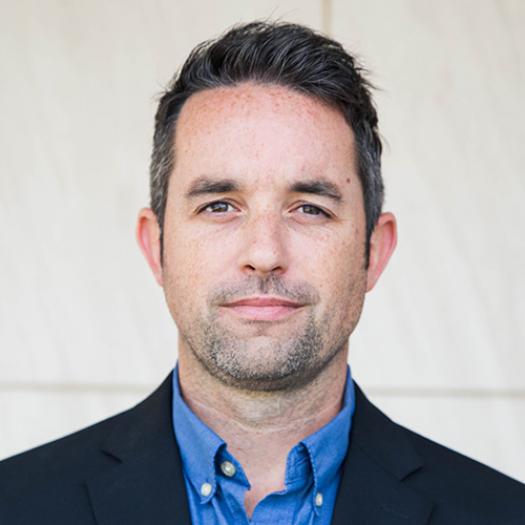
Michael Welch
Assistant Teaching Professor and Director of the Health & Exercise Science Program

Ling Xin
Assistant Professor

Tim Hanway
Assistant Professor of Practice and Internship Coordinator for the Health & Exercise Science Program
Related Programs
Undergraduate
-
BiochemistryBS
- BS
-
BiologyBS, Minor
- BS
- Minor
-
BiostatisticsMinor
- Minor
-
ChemistryBS, Minor
- BS
- Minor
-
Health and Exercise Science + Nutrition and Health Promotion (4+1)BS, MS
- BS
- MS
-
Health and Exercise Science + Physical Therapy (3+3)BS, DPT
- BS
- DPT
-
Health and Exercise Science + Physical Therapy (4+3)BS, DPT
- BS
- DPT
-
Nutrition and DieteticsBS
- BS
-
Nutrition and WellnessBS
- BS
